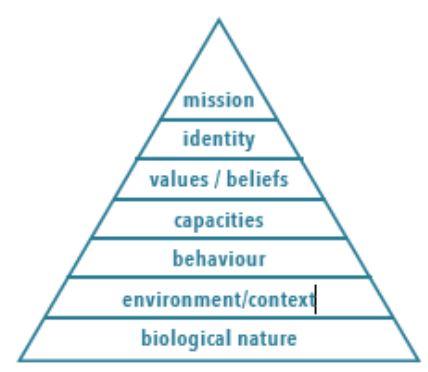- Country
- Belgium
- Target Audience
- Educators/academics
- Youth/pupils/students
- key themes association
- (Early) prevention
- Vulnerable youth and youth engagement in P/CVE
- Year
- 2024
Organisation
GO! Royal Athenaeum Antwerp
The training is organised in cooperation with the GO! Royal Athenaeum Antwerp and Arcturus.
Type of Organisation: NGO
Project description
Theory of the logical levels Bateson
There are many misconceptions about identity. Many people identify with their environment or with acquired factors like religion, the particular subculture they identify with, or even what they engage with on the internet. In order to clarify what constitutes a person’s identity, we use Bateson’s pyramid, which breaks down identity into different levels, each one linked to the underlying level. When change occurs on one level, this can also translate to other levels.

Who you ‘are’ forms the tip of the pyramid, your identity and ambitions, namely, what you wish to achieve in life. This point is supported by a broad base, which doesn’t represent your identity, but consists of a series of attributes that you absorb, through your education, your situation at home, at school and through your friends.
Your biological nature and the environment you grow up in forms the basis of the pyramid. We have added the biological factor to the pyramid, because it has been shown that IS propaganda targets the limbic system in the brain. On top of that comes behaviour, which is mostly taught. Next comes a layer of capacities. This is complemented by values and convictions that are fed to you, at home, by your religious or philosophical education and by your peer group.
Your surroundings, behaviour, abilities, values and convictions are given to you in your youth. That is what eventually determines who you are. The difference between who you are and what you have acquired is significant. Religion forms part of the bottom layer of the pyramid, of the elements you absorbed. These days, however, we have noticed that many young people identify completely with Islam.
Religion constitutes a choice, not a person’s identity.
The school opted to use the model of Bateson after an infiltration by the jihadist group Sharia4Belgium. A wave of radicalisation swept through the school. The approach is situated on the following four levels:
- 1. Two people qualified as an NLP master.
- 2. Ten teachers qualified as an NLP practitioner.
- 3. Every year 12 teachers attend a four-day NLP course: it is of vital importance to provide tools and support to teachers who face youngsters who are at the risk of radicalisation. Among other things, they learn how to counter pupils’ identification with negative selfimages, how to foster a healthy self-esteem.
- 4. At the same time, youngsters are made more aware of the impact of their choices and they are offered the opportunity to make different choices in life by using the triangle. The process is about identity formation. This is a two-day training.
- 5. The possibility for individual coaching (for teachers or students) if necessary. The overall aim is to empower students and give them the insight that they can steer their destinies.
We are linking our project to the project ‘Circles – we have the choice’ of Kristin Verellen. This project has been presented at the RAN Joint event RAN EDU–RVT. Circles are meaningful encounters with a group of people to reflect about what happens to each of us in this age of hardening and extreme violence. http://wehavethechoice.com
The project has also collaborated with the Athena-syntax project in the schools. This project is also a part of the RAN Collection.
This good practice was developed during the period of problematic Islamic radicalisation and in follow-up to the war in Syria and departing youth. Today, however, we live in a hyper-polarised society and polarisation and radicalisation have become a many-headed monster: in addition to proselytising Islamist Salafism, we notice extreme right-wing extremism, the woke debate that is fierce in our schools, LGBTQ thinking, anti-women thinking, climate activists, etc.
Precisely because of this recent evolution, the training offer has been updated and this good practice is integrated into a general basic training 'prevention of radicalisation and polarisation'. Here, we examine how radical thinking comes about, when it is problematic and when we speak of extremism. We reflect on the different forms that exist and what the associated characteristics are. We also look at the challenges this poses in practice and provide information on how front-line workers, local authorities, teachers, youth workers, welfare workers, etc. can deal with these challenges. This model is integrated into this training.
A new training offer will be rolled out within all GO! schools. In the previous school year 2022-2023, tailor-made formations were provided. During this school year 2023- 2024, the key persons who were activated in 2015 will be reactivated.
In September 2023 we reactivated these key figures in Given the fact that we notice a lot of tensions, polarisatin & proselytism in different schools, we give these key people a packet of digital trainings ( 5X2 hours ) to refresh their knowledge and follow up on the new trends and possible actions at school level. In the training we envolved our different good practices : the prevention piramid, Identity and communication, Athena-syntax & the CCA method. We linked them to the polarisationmodel of Bart Brandsma. We rolled out this training in different schools over Flanders. We reached out also jewish schools.
Deliverables
- In an initial phase, 24-day training programme for the NLP practitioner qualifications for 12 teachers
- In an initial phase, 24-day training programme for the NLP master practitioner qualifications for the principal and the assistant principal
- 4-day training programme for twelve teachers on an annual basis (basic)
- Together with external partners we offer a training for youth (a four-day, 2 hour training + activities during the school year)
- There is also a video about the different activities at school
- Individual coaching sessions
